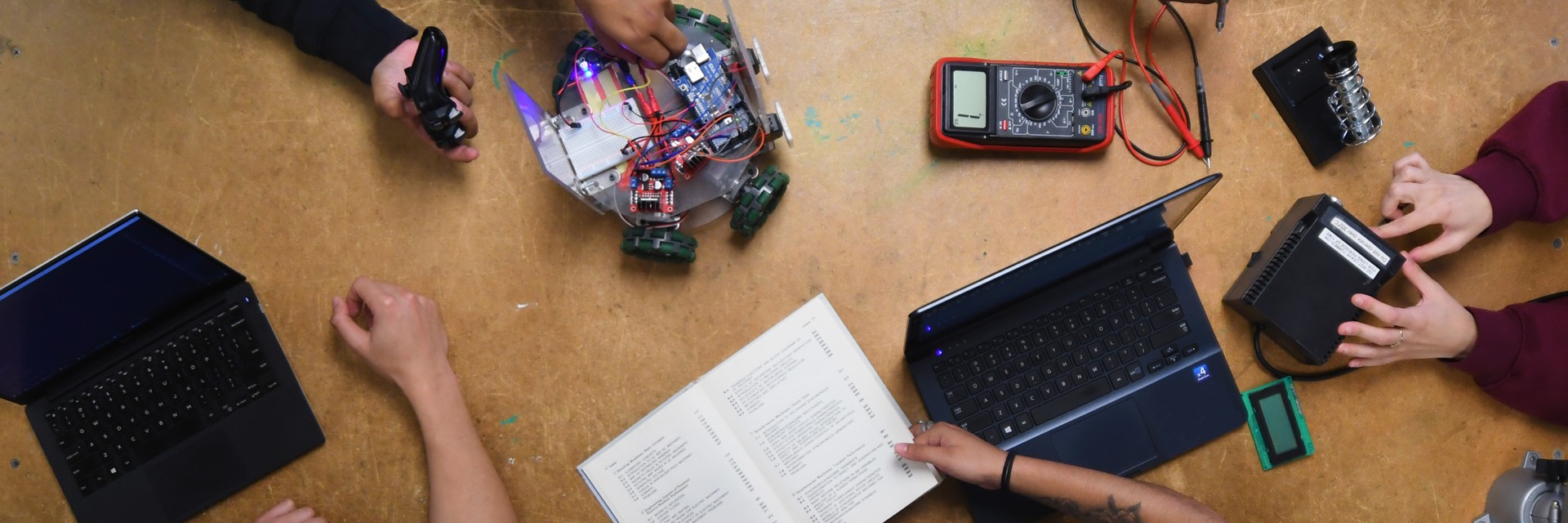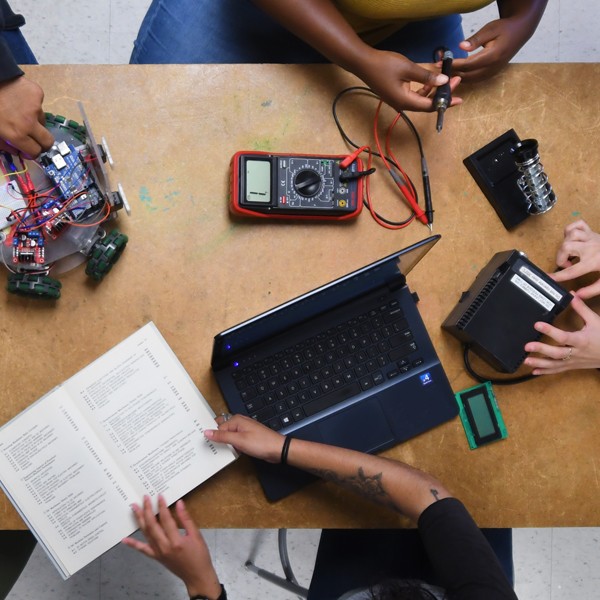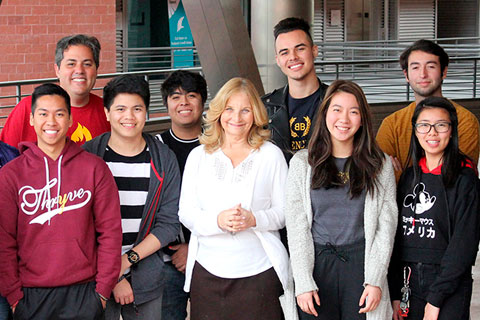Photo: FYrE Student Mentors, Dr. Gustavo Menezes, Dr. Sharri Kornblum
FYrE Works to Create a College That is Student-Ready
Fall 2021 marked the arrival of the 7th cohort of students participating in ECST’s First Year Experience@ECST (FYrE) program. A cornerstone of ECST’s Acceleration Initiative, the FYrE program provides incoming freshmen with skills and support that help them achieve academic excellence and reduce the time it takes to complete STEM degrees at ECST. The 2021-22 school year is a pivotal time for FYrE as National Science Foundation (NSF) support for the program concluded with the 2020 cohort and the program must now be funded through other sources.
ECST created FYrE because the college serves a student population that is predominantly low-income and first-generation college-goers. These students have not had the same opportunities as students in other circumstances. As a result, many arrive at ECST less prepared in math and science, without experiencing the benefit of many college success strategies that students with college-educated and wealthy parents may have had. Further, because Cal State LA is a commuter college with most students living at home, the vast majority of ECST students must balance school with family responsibilities.
With initial support from the Helmsley Trust, ECST launched FYrE in 2014. In 2017, ECST was awarded a multi-year grant from the NSF to expand the scope and range of FYrE interventions and scale the program to serve every calculus-ready first-year student. Any freshman who participates in ECST’s STEP program, a summer bridge between high school and college, can choose to participate in FYrE.
“The goal of FYrE is to move away from the idea that our students are ‘lacking’ in some way or not college-ready, to creating a college that is student-ready,” says ECST Dean Emily Allen. “After seven years, we have data that shows the FYrE program provides our students with a community of friends, peers, staff, and faculty, as well as study skills and attitudes to help them master their challenging degree programs. We tell them the first day, “Do what is hard and life will be easy,” and our graduating FYrE students report back that the foundation they built in FYrE served them well throughout their time at ECST, and especially during the pandemic. We also know there is more we can do. Another motivator for our work is knowing that the programs we are creating are relevant not just for us, but for engineering and computer science colleges across the country serving similar student populations.”
Today, the FYrE program focuses on five key success factors: community building, academic support, university and career navigation, close working relationships with university partners, and assessment and research. While all five components of the FYrE program are important to student success, Dr. Gustavo Menezes, Professor of Civil Engineering, and Faculty Director of the FYrE@ECST program since 2016, points to several aspects of the program that have proven to make the biggest difference:
ECST created FYrE because the college serves a student population that is predominantly low-income and first-generation college-goers. These students have not had the same opportunities as students in other circumstances. As a result, many arrive at ECST less prepared in math and science, without experiencing the benefit of many college success strategies that students with college-educated and wealthy parents may have had. Further, because Cal State LA is a commuter college with most students living at home, the vast majority of ECST students must balance school with family responsibilities.
With initial support from the Helmsley Trust, ECST launched FYrE in 2014. In 2017, ECST was awarded a multi-year grant from the NSF to expand the scope and range of FYrE interventions and scale the program to serve every calculus-ready first-year student. Any freshman who participates in ECST’s STEP program, a summer bridge between high school and college, can choose to participate in FYrE.
“The goal of FYrE is to move away from the idea that our students are ‘lacking’ in some way or not college-ready, to creating a college that is student-ready,” says ECST Dean Emily Allen. “After seven years, we have data that shows the FYrE program provides our students with a community of friends, peers, staff, and faculty, as well as study skills and attitudes to help them master their challenging degree programs. We tell them the first day, “Do what is hard and life will be easy,” and our graduating FYrE students report back that the foundation they built in FYrE served them well throughout their time at ECST, and especially during the pandemic. We also know there is more we can do. Another motivator for our work is knowing that the programs we are creating are relevant not just for us, but for engineering and computer science colleges across the country serving similar student populations.”
Today, the FYrE program focuses on five key success factors: community building, academic support, university and career navigation, close working relationships with university partners, and assessment and research. While all five components of the FYrE program are important to student success, Dr. Gustavo Menezes, Professor of Civil Engineering, and Faculty Director of the FYrE@ECST program since 2016, points to several aspects of the program that have proven to make the biggest difference:
- Students in each year’s cohort take the same first-year engineering, physics, and computing classes to build community that is reinforced through study groups and social activities.
- Students receive academic support through Supplemental Instruction workshops designed to enhance critical thinking in math and physics that are facilitated by their older peers.
- Every student is assigned a second-year ECST student who participated in the program the year before as a peer mentor.
- Students have access to a dedicated academic advisor who helps them develop an integrated academic plan that ensures they complete their core first-year courses and develop their identity as engineers and computer scientists.
“Community is so important to our students’ first-year success,” says Professor Menezes. “Most of our students don’t live on campus, so being in a cohort—taking classes and studying and socializing together—gives them much needed support. The peer-facilitated workshops and mentors are also important. The truth is students will listen to each other more than they’ll listen to us.”
Gerardo Lopez, an academic advisor in the ECST Student Success Center assigned to FYrE, elaborates on why helping first-year students navigate the college is so important. “Engineering and computer science majors are not easy,” says Lopez. “But many of our students are also dealing with external issues out of their control: housing and food insecurities, no access to laptops or the internet, or lack of money to pay for college. These are problems that got a lot worse during the pandemic. Our greatest challenge is making it known to students what is available to them, connecting and linking them to resources, and helping them visualize their academic, career, and life goals.”
Dr. Daniel Galvan, Director of Acceleration Initiatives and Student Engagement, speaks to the value of the peer mentorship in the FYrE program. “Earlier cohorts in the program told us they wanted support from peer mentors, so we added them in 2019. The mentors are second-and third-year students who have experienced the program themselves. They work with first-year students on things like starting a resume so they can be ready to apply for summer internships, bringing in guest speakers who are working professionals in the field, and socializing outside the formal academic setting. The mentors also help the team have a pulse on what is going on with students. Everyone benefits, including the peer mentors, who learn leadership skills and career and life skills of their own as they mentor other students.”
Ralph Belleca, a fourth-year Computer Science major and a FYrE peer mentor for the past two years, is a big proponent of mentors. “I was in the FYrE program my first year and it was great,” says Belleca. “So, when I had an opportunity to become a FYrE peer mentor, I said yes. Peer mentors are great for learning things that are not taught in classrooms, like what kinds of things should I add to my resume or should I go to graduate school. Being a peer mentor is a chance to pass on the learning.”
In addition to the positive experiences reported by FYrE participants, an external assessment of the FYrE program completed in July 2021 found that the program is also succeeding by the numbers. Efforts to expand the number of students served by FYrE after a pilot program ended in 2016 resulted in a doubling of participation in 2018. In the falls of 2019 and 2020, participation almost tripled.
Over the years, FYrE has also made substantial progress meeting the program’s student academic achievement goals. During the first three years of FYrE, fewer than 40% of participants completed and passed Calculus 1 and 2 and Physics I within one year. These core courses are required to advance from pre-major to major status and for students to have any chance of graduating in four years. The 2019 FYrE cohort had a 78% success rate in the three core courses despite having to switch to online learning during the last three months of the academic year due to the pandemic. The 2020 FYrE cohort achieved a 69% success rate in their core courses. This is an impressive outcome, given that it was achieved by students who completed their entire first year of college online. Even more importantly, 92% of the FYrE cohort returned for their second year, compared to only 72% of the university’s overall Fall2020 class, reflecting the nationwide drop in the Fall 2020 cohort re-enrollment rate due to the pandemic. The FYrE program has proven to be critical to ECST students returning to campus.
The numbers are important, but so is the impact on the students who participate and on the faculty and other professionals in the FYrE program who support them. Professor Menezes sums it up: “I see where these students come from, I know their families, I go to their weddings. And when they graduate, I see them go to work at companies like Boeing and Google. That makes a huge difference in their lives and means everything to me.”


